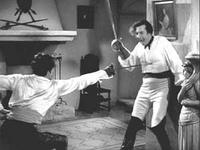The Mark of Zorro (1940)
 Tyrone Power's Zorro fights for family honour and the restoration of benevolent patriarchy.
Tyrone Power's Zorro fights for family honour and the restoration of benevolent patriarchy.Unlike Douglas Fairbanks's 1920 version, the 1940 remake depicts Empire, centre as well as periphery: the film opens with the young Diego de la Vega in Madrid, before he is called home to California. Spain, however, is in this portrayal some kind of cross between finishing school and holiday camp. There's little sense that the colonial enterprise is a matter of economic and political power relations. Empire, in short, is not here seen as a problem.
What is problematic is when Empire is subject to corruption.
For The Mark of Zorro, colonialism can and should be essentially pacific. Diego tells his fellow "young blades" busy learning "the fine and fashionable art of killing" that nothing happens in California: it is a land, he reports, of "gentle missions, happy peons, sleeping caballeros, and everlasting boredom." There "a man can only marry, raise fat children, and watch his vineyards grow."
But on returning, Diego discovers that this idyllic somnolence has been disturbed, as his father the alcalde has been overthrown and in his place is installed the avaricious pretender Don Luis Quintero with Captain Esteban Pasquale serving as his vicious sidekick. Lear-like, Diego's father Don Alejandro Vega has been humiliated, dispossessed, and subject to internal exile. The son therefore masquerades as the avenging Zorro in order to reinstall his emasculated progenitor.
 Zorro's violence (and he is violent in a way that Fairbanks's character never is, killing his nemesis Pasquale with very little compunction indeed) is, as Julian Savage also argues, restorative rather than revolutionary. It's a displaced violence, performed by the prodigal son rather than the father himself, so absolving the virtuous patriarch, who refuses to take up arms, of any taint of coercion.
Zorro's violence (and he is violent in a way that Fairbanks's character never is, killing his nemesis Pasquale with very little compunction indeed) is, as Julian Savage also argues, restorative rather than revolutionary. It's a displaced violence, performed by the prodigal son rather than the father himself, so absolving the virtuous patriarch, who refuses to take up arms, of any taint of coercion.With his father back as mayor, Diego can finally settle down with his new-found wife, to raise his own fat children and watch his own vineyards grow--though one presumes that they don't grow far without some input from the "happy peons" and their labour power.
California, in short, and the Los Angeles in which the film's action is specifically set, can return to being the California familiar from so much Hollywood output of this period: a place of relaxation and leisure, natural fertility and good living, fortunately somewhat removed from world events. Oh, and underpinned by unacknowledged Latino labour.
 It would not be long, though, before Power himself would have to gird up his fighting loins, first putting Hollywood on a war footing in an early World War II propaganda film, and then transforming himself from indolent matinée idol to man of war.
It would not be long, though, before Power himself would have to gird up his fighting loins, first putting Hollywood on a war footing in an early World War II propaganda film, and then transforming himself from indolent matinée idol to man of war.All very inspiring, no doubt. But why should we imagine that Hollywood either before or after the war was so very free from corruption?
